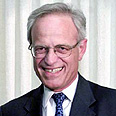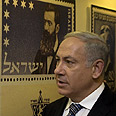

Indyk: Netanyahu must choose – Obama, or Right
In New York Times article, former US ambassador to Israel addresses root of political crisis between Washington and Jerusalem, says Obama views Iranian nuclear program, Israeli-Palestinian conflict as two sides of same coin while Netanyahu believes construction dispute only boosts Iran
WASHINGTON - "Netanyahu must make a choice," former US Ambassador to Israel Martin Indyk said in an article published in the New York Times titled: "When your best friend gets angry."
Indyk, who is considered close to the Obama administration, wrote that the Israeli prime minister must choose between facing off with the president of the United States or facing off with his right-wing coalition partners.
"The shift in America’s Middle East interests means that Netanyahu must make a choice: Take on the president of the United States, or take on his right wing. If he continues to defer to those ministers in his cabinet who oppose peacemaking, the consequences for US-Israel relations could be dire."
Indyk, who currently serves as the vice president and director of Foreign Policy at the Brookings Institution, and as an advisor to US Mideast envoy George Mitchell, added that Netanyahu did not attend the Washington nuclear summit at the start of the month because he did not have an answer to Obama's demand for a construction freeze in east Jerusalem.
"The president views curbing Iran’s nuclear program and resolving the Israeli-Palestinian conflict as two sides of the same coin. In order to isolate and pressure Iran, he believes he needs to unite Israelis and Arabs with the rest of the world in a grand international anti-Iranian coalition," he wrote.
He added that the Arab leaders are as concerned about the Iranian threat as Israel is, but that the lack of progress on the Palestinian issue allows Iran's leaders "to play to the Arab street, claiming they are the real supporters of the Palestinian cause through sponsorship of violence and terrorism and threats to destroy Israel, with Mahmoud Ahmadinejad seen as the hero."
The former ambassador said Netanyahu rejects these "linkages" and claims that a solution to the Palestinian problem will not change the Iranians' intentions and that only Israeli force will deter Hamas and Hezbollah.
He said Netanyahu feels "the split with the United States over building in east Jerusalem only encourages Tehran to believe that Obama will restrain Israel from striking Iran’s nuclear facilities."
"Whoever is right," he wrote, "there is no denying the reality of a fundamental disagreement, one that has poisoned relations between the American and Israeli leaders."
He stressed that, "At the heart of this disagreement lies a dramatic change in the way Washington perceives its own stake in the game."
He cited comments made by former Secretary of State Condoleezza Rice some three years ago, when she declared in a speech in Jerusalem that "US strategic interests were at stake in resolving the Israeli-Palestinian conflict."
He said that President Obama reiterated this approach last week when he said resolving the Arab-Israeli conflict is a “vital national security interest” for the United States.
Indyk wrote, "This is no longer just about helping a special ally resolve a debilitating problem. With 200,000 American troops committed to two wars in the greater Middle East and the US president leading a major international effort to block Iran’s nuclear program, resolving the Israeli-Palestinian conflict has become a US strategic imperative."
He added that from Obama's perspective, Israel's decision to build in the Jerusalem suburbs had dealt the US a strategic setback.
"Deferring building announcements and other provocative actions in east Jerusalem thus became the litmus test of Netanyahu’s commitment to the common cause of curbing Iran’s nuclear enthusiasm," he said.















